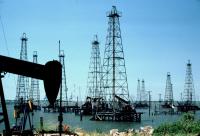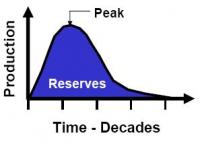Peak Oil
Where did oil come from and what is it like underground?
Oil can be thought of as fossilised sunlight – energy that was trapped by plants millions of years ago. When the plants died, their remains were covered by sand and silt at the bottom of the seas. Heat, pressure and the passing of time changed the remains into oil, trapped between the grains of rock. Within the deposit, the lightest, thinnest crude oil, sometimes mixed with gas, worked its way to the top of the oil pocket, floating on the heavier, stickier crude oil below.
How do we get at it?
When an oil drill enters such deposit for the first time, it is the gas and the light, easy to use crude that gushes out first. As time passes and more drilling rigs are used, the pressure drops and the oil must be pumped out. Water may have to be forced down into the oil field to push the remaining sticky, heavy crude out – this slows down the extraction process and the product is more expensive to refine.  Eventually, even though some oil remains trapped in the rock, the expense of pumping becomes too great – the oil field is abandoned and the oil company moves on to find a new field.
Eventually, even though some oil remains trapped in the rock, the expense of pumping becomes too great – the oil field is abandoned and the oil company moves on to find a new field.
So a typical oil field has a maximum flow rate about half way through its life, what is called the production peak. Because the same is true of the total oil production from a collection of oilfields, we can think of a production peak for the whole oil region such as the North Sea. There is still oil and natural gas in these fields, but production peaked in 1999 and has been in steep decline since then. We are now increasingly depending on imported fuels and live in a post-production peak country.
Peak Oil – What’s that?
The production peak of all the world’s oil fields put together is what is called peak oil. Worldwide discoveries of new oilfields peaked in 1965. Global oil production has now levelled off at about 85-87 million barrels a day, even though oil companies are trying their best to meet a growing world demand. They are opening new fields all the time, but these are often small pockets in difficult to reach places, such as ultra-deep water, making extraction difficult and expensive. We are at world peak oil – a world of energy resource depletion as other non-renewable fuels such as natural gas, coal and uranium will also run out in time, with varying degrees of urgency.
When market demand for any commodity goes up while supplies are falling, the inevitable result is price rises. As oil-producing countries realise the implications of peak oil and the value of the oil they are sitting on, will they not put up the price to us, or even decide to keep their remaining oil for their own citizens? Countries are scrambling to lay claim to remaining deposits and the risk of international conflict rises.
I live in Worcester – Does this matter to me?
We can see the long shadow of peak oil as prices rise at the pumps in Worcester garage forecourts and in our household fuel bills. We see it in the rising cost of food in our supermarket trolley as every calorie of food we eat hides 10 calories of energy that came from oil – oil used in growing, fertilising, transporting, processing and cooking that food and getting it to our plate. Plastic is everywhere in all the stuff we use – plastic comes from oil. Metals are everywhere in our lives, mined and extracted using energy from oil. We use timber and paper everyday, but trees are felled, processed and brought to market thanks to oil energy. The medicines we reach for when we are ill, the whole pharmaceutical industry, is oil dependent. Water is pumped and purified with oil energy – and so the list goes on.
Worcester as oil goes away
We have become dangerously addicted to this magic fossil sunlight and all it can do for us. We have gobbled world reserves at a frantic rate. In the last hundred years, humanity has used up half the total world oil reserves. At the current rate of consumption, the remaining oil reserves will be used up in 20 to 30 years. Fossil sunlight caught over millions of years, burnt up in a splurge of 75 years, with the waste gases of combustion going out into our atmosphere, contributing to climate change. It becomes clear that we must learn to live fulfilling lives using less energy. We must wake up to the realities of life after oil.

